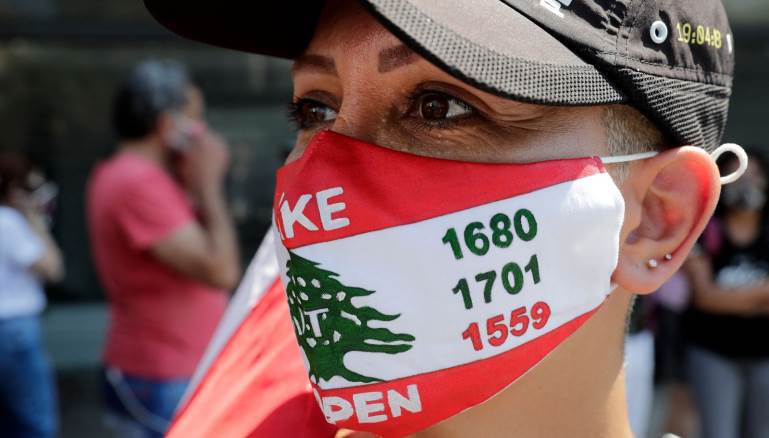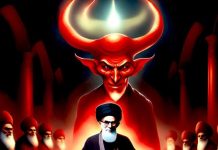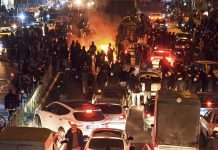Can Lebanon be neutral on the Arab-Israeli conflict?…A groundbreaking conference near Beirut seeks a new definition of Lebanese patriotism, one that does not equate with supporting perpetual war with Israel
David Daoud/Times Of Israel/April 27/2022
الخبير في القانون الدولي ديفيد داوود/تايمز اوف إسرائيل: مؤتمر، “الحياد الدولي للبنان” أكد أن أكثرية اللبنانيين لا يؤيدون سياسة وثقافة الحرب الأبدية مع إسرائيل ويطالبون بحياد لبنان وبالسلام والإنفتاح على العالم
30 نيسان/2022
تقرير
لا يزال مؤتمر “الحياد والمؤتمر الدولي الخاص بلبنان”، الذي انعقد برعاية البطريرك الماروني مار بشارة بطرس الراعي نهاية الأسبوع الماضي، يستقطب أقلام الصحافيين المحليين والعالميين، وفي هذا الإطار اعتبر الخبير في القانون الدولي ديفيد داوود أنّ المؤتمر أرسى مفهومًا جديدًا للوطنيّة اللبنانيّة بدعمه حياد لبنان الكامل عن الصراعات الاقليميّة، وهو الأمر الذي يناقض توجّهات حزب الله وشركائه في السلطة بالإبقاء على الصراع مفتوحًا مع إسرائيل، كما أنّه يُناقض أفكار الداعين إلى الحياد الجزئي، وهو، الحياد، الحلّ الناجع لخروج لبنان من أزماته الاقتصادية المتفاقمة.
على المستوى النظري، يُمكن القول أنّ المؤتمر أسّس للتنافس مع حزب الله في مجال الأفكار والايديولوجيا، بالرغم من أنّ القوّة الفعليّة ستستمر لصالح الأخير (طالما هو يحافظ على سلاحه غير الشرعي).
ومن أبرز ما جاء في كلام داوود المرتكز على معاينته ورشة عمل المؤتمر: يتألف تنظيم حزب الله من مواطنين لبنانيين، إلّا أنّه يتبع اِيديولوجيًّا لإيران ويخضع لوصايتها ويعتمد على مساعداتها باعتراف قياداته العليا، ولا يتردّد في إخضاع مصالح لبنان لمصالح طهران. فقد سمحت معادلة العداء لإسرائيل لحزب الله بنقل القرار الوطني اللبناني من بيروت إلى طهران. وكانت النتيجة مدمّرة.
حاول المؤتمر سدّ هذه الفجوة من خلال توسيع نطاق الحياد اللبناني بشكل لا لبس فيه: لا الانضمام إلى عملية التطبيع العربية الإسرائيلية المعروفة باسم اتفاقات إبراهيم، ولا الحفاظ على لبنان كساحة معركة دائمة ضد إسرائيل. وتعزيزا لترسيخ الحياد، تحدى المؤتمر أيضا القوانين اللبنانيّة المناهضة للتطبيع، خصوصًا أنّها، على سبيل المثال لا الحصر، باتت تطال المواطنين اللبنانيين الذين يعملون في الامارات العربيّة المتّحدة بعد تطبيعها مع إسرائيل، إذ هي، أي القوانين، تُجرّم كل لبناني يتواصل مع إسرائيليين ولو بمشاركة بسيطة غير ضارة عبر تويتر.
وقدّم منظمو المؤتمر الحياد كرؤية بديلة للبنانيين، تُعيد تعريف الوطنية على أنّها استثمار في بناء لبنان وتوفير الرخاء والأمن لمواطنيه. وهم يَعون أنّ إضعاف حزب الله، أو حتّى نزع سلاحه وحلّه بالكامل، لن يكون كافيًا لإنقاذ لبنان، إلّا أنّه الشرط الأساسي والضروري لاستعادة اللبنانيين قرارهم من أيّة وصاية أجنبيّة، والحياد هو الخطوة الأولى لحلّ بقية مشاكل البلاد.
في أسفل نقالة ديفيد داوود الكاملة بالإنكليزية
Can Lebanon be neutral on the Arab-Israeli conflict?…A groundbreaking conference near Beirut seeks a new definition of Lebanese patriotism, one that does not equate with supporting perpetual war with Israel
David Daoud/Times Of Israel/April 27/2022
https://blogs.timesofisrael.com/can-lebanon-be-neutral-on-the-arab-israeli-conflict/
Lebanon was born as a house divided. Today, that division manifests in conflict between an Iran-backed “Resistance Camp” that unilaterally wages war on behalf of the country, and a large swath of the population aspiring to normalcy. This weekend, elements of the latter convened a conference in Harissa to call for Lebanon to adopt neutrality in regional conflicts and, in so doing, offer Lebanon a path out of its present crisis. The conference – conceived as the launch of an ongoing series of initiatives – convened under the patronage of Maronite Patriarch Bechara Boutros al-Rai, but also included religious and secular representatives from all of Lebanon’s ethnicities and sects. Together they built the case that steering Lebanon back to a course of neutrality in foreign affairs would also open the possibility of an investment-based recovery for the faltering Lebanese economy.
Similar initiatives have been attempted in the past, foundering on ambiguity and selective application of neutrality. Former prime minister Saad Hariri’s 2017 call for Lebanese “dissociation” from regional controversies, for example, failed to explicitly extend neutrality to the Arab-Israeli conflict. Hezbollah and its governmental partners exploited this loophole to gut Hariri’s advocated neutrality of any meaning. Falling back on an alleged “Islamic, Arab, and Lebanese consensus” on liberating Palestine, they argued that waging war against Israel didn’t violate the principle of Lebanese neutrality.
This past weekend’s conference attempted to close that gap by unambiguously extending Lebanese neutrality to the Arab-Israeli conflict, and defining it to mean just that: neither joining the Arab-Israeli normalization process known as the Abraham Accords nor maintaining Lebanon as a perpetual battlefield against Israel. In furtherance of entrenching neutrality, the conference also challenged Lebanon’s anti-normalization laws, which criminalize people-to-people contacts between Lebanese citizens and Israelis as innocuous as sharing a DM on Twitter.
Participants stressed that their proposal to repeal the laws was not a call for normalization in the sense of a peace treaty between the two governments. It was rather a case to align the legal system with a core tenet of neutrality: the principle of an open society. The same laws, they noted, also drive a wedge between the country and 300,000 Lebanese citizens residing in the UAE; prevent Lebanese from engaging Palestinian efforts to foster civil society in their territories; and prevent Lebanese individuals and businesses from profitably engaging multinational companies that do not abide by any exclusionary laws.
In adopting these positions, the conference and its participants sought to reclaim and redefine the concept of Lebanese patriotism. For much of Lebanon’s history, that became almost synonymous with supporting perpetual war with Israel in the name of the Palestinian cause. That this permanent bellicosity failed to advance Palestinian rights and resulted only in misery and destructive conflict for Lebanon mattered little. It was an ideological mainstay that many Lebanese feared to challenge lest they be labeled traitors, and which certain domestic and foreign actors had a self-serving interest in maintaining.
Hezbollah’s dominance
Hezbollah is precisely such an actor. Though based in Lebanon and comprised of Lebanese citizens, Hezbollah is more dependent on foreign tutelage and aid than any of its rivals. By its own senior leadership’s admission, the group is ideologically subservient to Iran, and it has not hesitated to subordinate Lebanon’s interests to those of Tehran. The equation of Lebanese patriotism with enmity toward Israel has allowed Hezbollah to dominate Lebanon’s national narrative, and to transfer decision-making on the Lebanese national interest from Beirut to Tehran. The outcome has been devastating.
For decades, Lebanese have had to live under threat of war – or with the consequences of Hezbollah’s periodic devastating clashes with Israel – with little to no say in the matter. Furthermore, to maintain its private arsenal and license to carry on endless resistance, Hezbollah both thrives off and feeds into Lebanon’s sectarianism. After all, the emergence of a real national identity could inevitably lead to the formation of strong state institutions, including an effective national army that would obviate the need for an armed sectarian militia unilaterally assuming the role of national defender.
But this sectarianism is also the source of endemic cronyism and corruption, which have sapped the country’s vitality, driven off foreign aid and investment, and plunged it into one of the worst economic crises in history. As the panelists noted, incredibly, Lebanon today attracts less foreign direct investment than North Korea.
An alternate vision
The organizers of this weekend’s conference sought to offer Lebanese an alternate vision, one that redefines patriotism as investment in building up their country and providing for the prosperity and security of its citizens. Critically, in contrast to prior activist calls, this conference also offered concrete plans on how to achieve that vision, and sought foreign assistance only after demonstrating the ability of the Lebanese to start delivering. On a theoretical level, this put them on a footing of being able to compete with Hezbollah in the realm of ideas, even if the disparities in actual power continue to strongly favor the latter.
As with all purported solutions for Lebanon’s woes, skepticism is warranted. Lebanese activists and politicians have a track record of promising change while failing to deliver. Nor is curtailing Hezbollah’s freedom of action, or even disarming and disbanding the group in its entirety, a panacea for all that ails Lebanon. The country’s problems run much deeper, and the group’s existence is a mere symptom, rather than their cause. However, while weakening the group is not sufficient to rescue Lebanon, it is the necessary precondition to the Lebanese reclaiming national decision-making from any foreign power – and that is the first step to solving the rest of the country’s problems.
*David Daoud is the director of Lebanon, Israel, and Syria research at United Against Nuclear Iran (UANI) and a nonresident fellow at the Atlantic Council



















